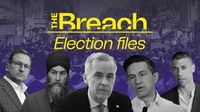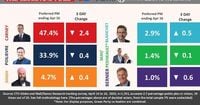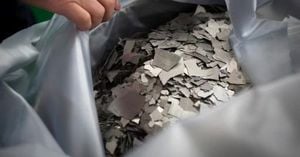As the English-language federal leaders’ debate unfolded on April 17, 2025, all eyes were on Mark Carney, the frontrunner aiming to solidify his lead in the race for Prime Minister. However, for those hoping to gain deeper insights into Carney's character or the Liberal party's record, the debate was likely to disappoint. These events often lack genuine accountability and meaningful discourse, favoring rehearsed soundbites over thoughtful policy discussions.
This edition of The Breach Election Files aims to dissect Carney’s record and unveil a decade of Liberal governance that, while posing as progressive, has primarily served the interests of the wealthy.
Mark Carney is presenting himself as a steady hand, an expert outsider prepared to lead Canada through turbulent times. Yet, critics argue that beneath his polished image of ‘pragmatism’ lies an austerity agenda reminiscent of past failures. If elected, Carney promises to fulfill the desires of corporate interests, proposing cuts to public spending and further entrenching the Liberal party’s shift to the right.
Over the past ten years, Justin Trudeau’s government has mastered the art of maintaining the status quo while masquerading as a champion of change. The Trudeau administration has seduced progressive voters by appearing to disrupt business-as-usual while simultaneously defending the interests of the elite. The government has been criticized for its cozy relationship with the oil industry, granting Big Oil significant influence and financial support. Notably, the cost of a controversial pipeline project has soared to a staggering $50 billion.
The Liberal party's foreign policy has also come under scrutiny. From backing Israel's military actions in Gaza to arming Saudi Arabia and establishing new military bases abroad, the Liberals have pushed Canada into a more aggressive global stance, deepening military ties with the United States.
Despite promises of reconciliation with Indigenous communities, Trudeau's administration has continued colonial policies, perpetuating land theft and corporate extraction. The so-called reconciliation era has provided cover for ongoing violence against Indigenous land defenders, complicating the fight for Indigenous rights and sovereignty.
While publicly advocating for welcoming immigrants, the Liberals have ramped up deportations and allowed the exploitation of international students and workers, creating a precarious labor force that benefits corporations.
In the lead-up to the debate, Carney announced the Liberal party's plan to tackle crime during a campaign stop at Sheridan College in Brampton on April 10, 2025. Joined by various Liberal candidates, including Dufferin-Caledon candidate Malalai Halimi, Carney emphasized the importance of being tough on crime, particularly regarding gun violence.
“We are taking action, all while respecting the longstanding traditions of hunting and sport shooting (and) respecting the traditions of Indigenous peoples,” Carney stated, outlining plans to automatically revoke gun licenses for individuals convicted of violent offenses, including intimate partner violence.
Moreover, Carney proposed strengthening firearms licensing and investing in the Royal Canadian Mounted Police’s (RCMP) national forensic laboratories and ballistics lab to enhance police capabilities in tracking firearms used in crimes. He also pledged to expedite the buyback of assault-style firearms and leave the classification of new firearm models to the RCMP.
To combat the influx of illegal guns and drugs from the United States, Carney announced plans to deploy more drones, helicopters, and personnel to the southern border. The Liberals aim to recruit an additional 1,000 RCMP officers and increase pay for cadet recruits, as well as hire 1,000 new Canada Border Services Agency (CBSA) officers.
Carney's proposals also included making bail harder to obtain for individuals charged with violent car theft, home invasion, and human trafficking. He emphasized the need to toughen sentencing guidelines for repeat offenders involved in violent and organized crime.
“We will protect the victims of sexual violence and intimate partner violence by making murder motivated by hate, including femicide, a constructive first-degree offense,” Carney declared. Additionally, he vowed to criminalize the production and distribution of non-consensual sexual deepfakes and increase penalties for sexual assault and the distribution of intimate images without consent.
In a bid to safeguard children from online exploitation, the Liberals will introduce legislation to provide new funding to the Canadian Centre for Child Protection. Furthermore, it will become a criminal offense to intentionally obstruct access to places of worship, schools, or community centers.
Carney also highlighted the importance of preventative measures in crime reduction, stating, “Ultimately, safe communities come from within, from who we are and how we treat each other.” He pledged to extend Canada’s Building Safer Communities Fund and support Indigenous-led community safety priorities.
As the debate approached, Carney’s poll numbers took a hit, dropping over two points to 47.4 percent, according to a recent CTV News and Globe and Mail poll. This decline may signal a shift in voter sentiment as the election draws near.
In a show of support, Canadian singer-songwriter Neil Young publicly endorsed Mark Carney in an open letter dated April 14, 2025. Young expressed his belief that Carney is the leader Canada needs to navigate current challenges and emerge stronger. “Without a doubt, you’ve got the chops to get it done. And man, you have got the guts to take it on,” Young wrote.
Young, who has been vocal about his discontent with U.S. President Donald Trump, highlighted the threats facing Canada, stating, “Canada is facing threats to its very existence, incredibly from people we thought were our friends.” His endorsement adds a notable cultural dimension to Carney’s campaign.
In addition to Young, actor Mike Myers has also shown his support for Carney, appearing in campaign videos and advocating for Canada’s independence from U.S. influence.
As the election approaches, the stakes are high for Carney and the Liberal party. With a mix of high-profile endorsements and a controversial record, the upcoming election will test the party's ability to connect with Canadian voters and address the pressing issues facing the nation.
Mark Carney's journey into politics began as Canada faced low points in trade relations with the U.S., and his economic expertise may be pivotal in shaping the future of the country. As the debate and election date draw closer, Canadians are left to ponder whether Carney's vision aligns with their hopes for a secure and equitable future.








